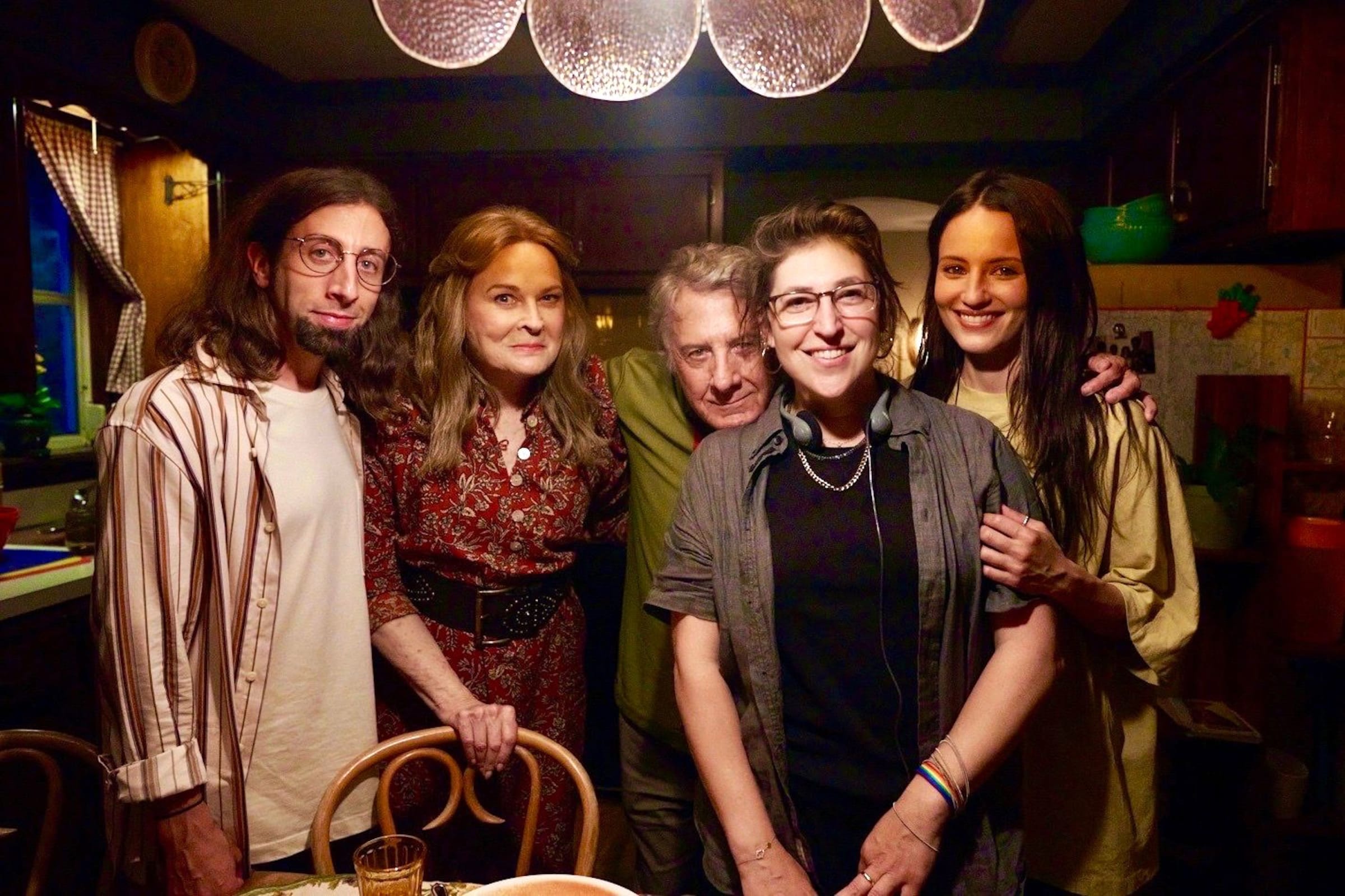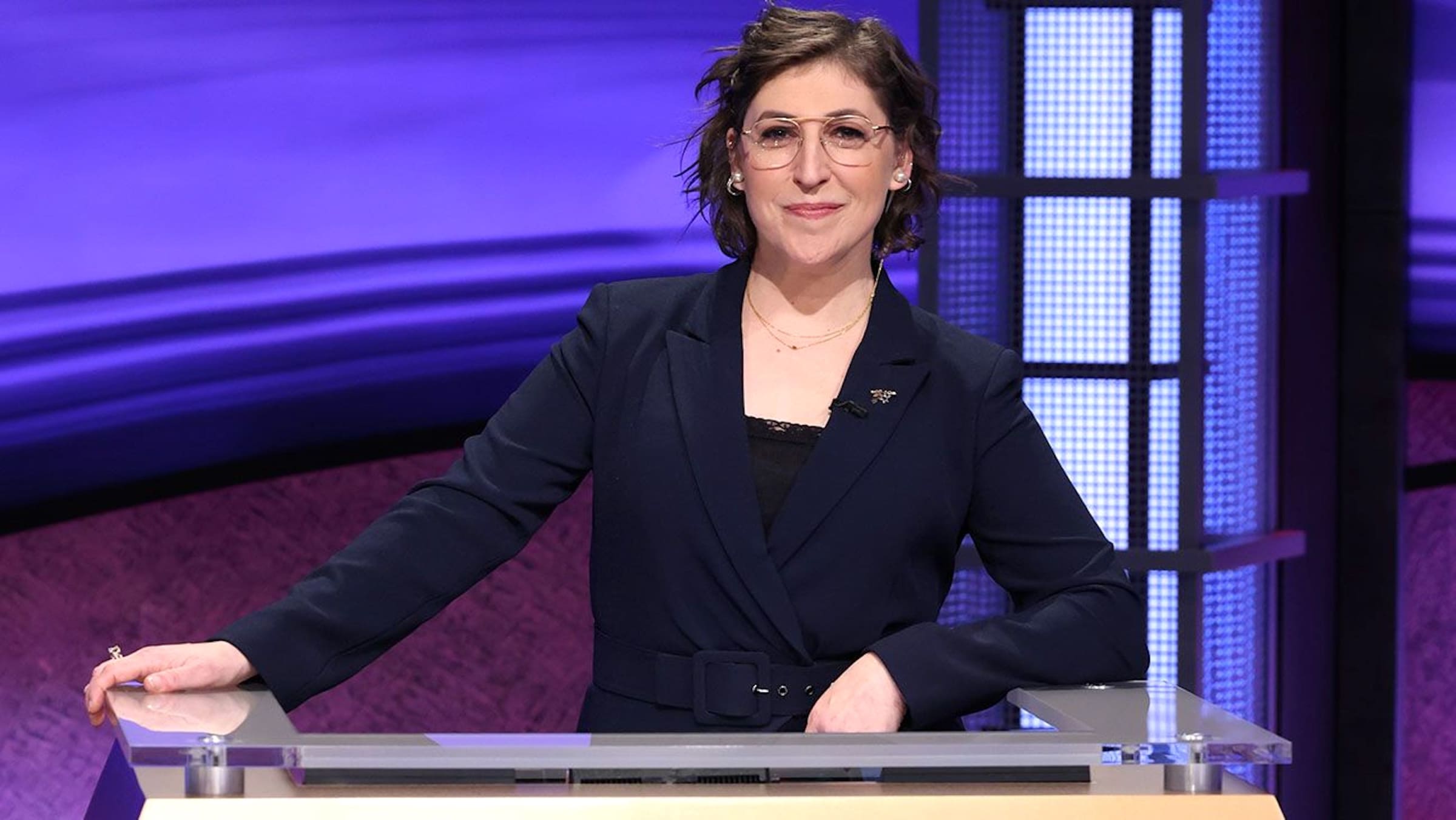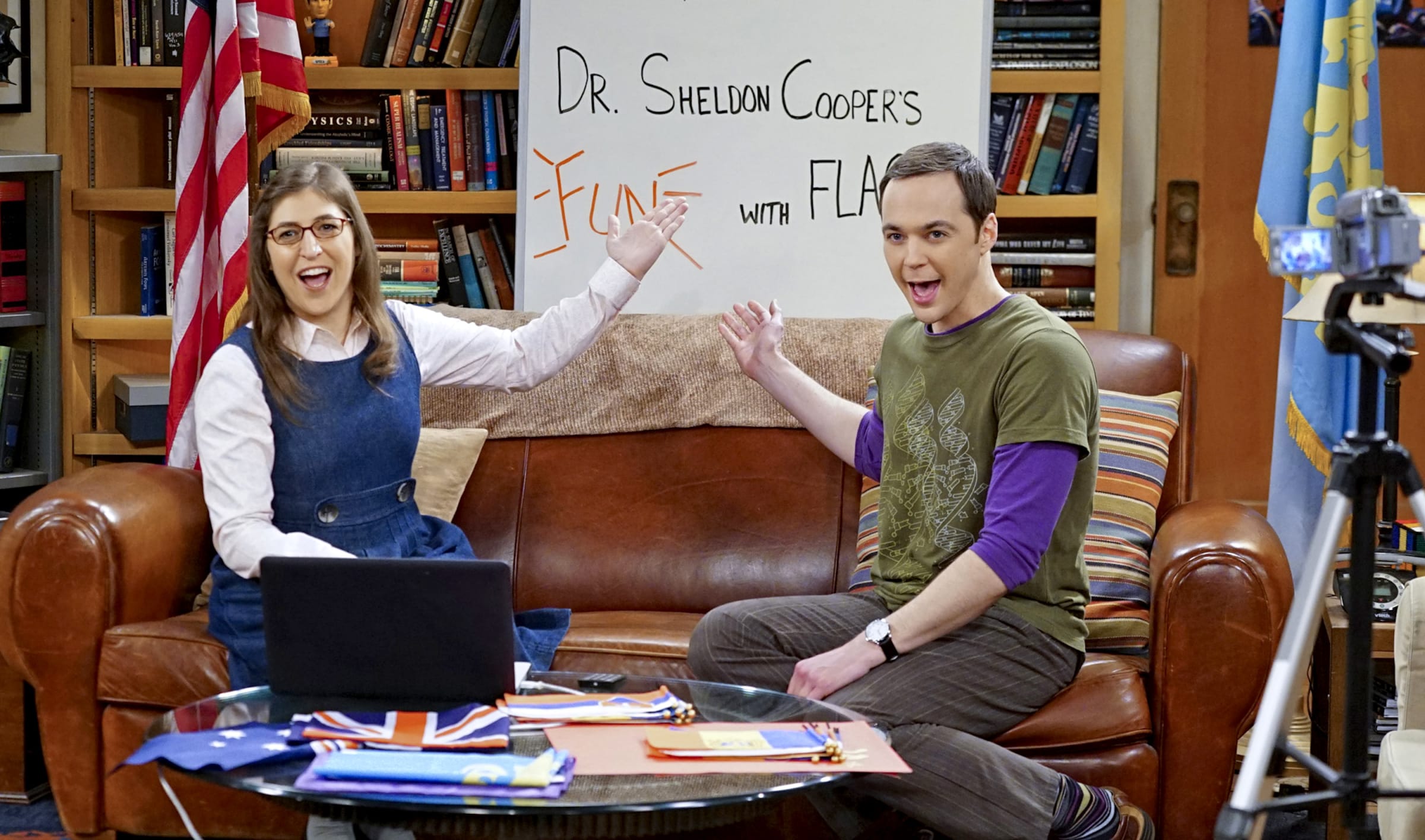Mayim Bialik on Vaccines, Jeopardy!, and Childhood Trauma

These are truly busy times for Mayim Bialik. Upon arriving at a Midtown Manhattan hotel for our interview—squeezed between a pair of morning-show appearances—her publicist informs me that she’s just awoken from a half-hour nap on a small couch in the lobby.
“The hotel probably isn’t very happy with me,” offers Bialik with a light smile.
The former Blossom and Big Bang Theory actress is currently starring in the Fox sitcom Call Me Kat, running the podcast Mayim Bialik’s Breakdown, co-hosting a little program called Jeopardy!, and promoting As They Made Us, a feature film she produced and directed during the pandemic based on her experience with divorce and the loss of her father. Oh, not to mention raising two kids as a single mother.
We’re here to discuss As They Made Us, a poignant drama centered on Abigail (Dianna Agron), a divorced mother of two grappling with the declining health of her father (Dustin Hoffman) and the relentlessness of her mother (Candice Bergen), whose harsh, judgmental nature has alienated her brother (Simon Helberg) from the family. As she sits bedside with her dying father, Abigail processes the abuse, both physical and psychological, she and her brother endured as children, and the way it’s shaped them.
“I started writing it about six years ago,” Bialik tells me. “My father passed, and then there is a year of mourning in traditional Judaism, and after that year I began writing—but not with the intention to write a movie.”
In addition to putting her childhood trauma on screen, Bialik found herself under the microscope while auditioning for the role of Jeopardy! host—a role she eventually won, along with co-host Ken Jennings, after the show’s executive producer Mike Richards was fired as host over his history of alleged harassment and discrimination. A number of Bialik’s past comments, including her declaration that she had a “non-vaccinating family,” received heavy scrutiny.
We spoke about all that and more over the course of our chat.
I read that there were some pandemic complications with production on As They Made Us.
We were delayed for COVID and then we filmed pre-vaccines. So, we were in Jersey and there had just been a little bit of a dip, but it was the first time I’d gone anywhere during COVID, and honestly, it’s the first time I’d gone anywhere until now. It’s hard to direct your first film and really hard to do so with a skeleton crew because of COVID, and also on a very small budget. Because I’d never done it before I had nothing to compare it to, but it definitely felt like a lot.
How autobiographical is the film? Because you did lose your father and went through a divorce.
I guess the way I describe it is: It’s not autobiographical, because things happen in the film that never happened.
Like you dating a hot carpenter?
[Laughs] I actually did date a hot carpenter. That was true! But there are things that happened differently than the way the actors chose to portray them. The actors were free to—and did ask for—rewrites for certain things that didn’t feel exactly right. When you’re writing this story, you have to write what tells the best story for a film, and life doesn’t always follow that. So, definitionally, it’s not autobiographical. Are there things taken from my life? Yes. I like to say that it’s based on my childhood and the childhoods of many people who may have grown up with mental illness or with addiction and we didn’t talk about it. My mom is very specifically concerned because Candice Bergen plays an abrasive character, and I just keep reminding my mom—and everyone else—that it’s not my mom. It’s Candice Bergen’s take on a character I wrote that tells a very specific story.

Mayim Bialik and the cast of As They Made Us
Quiver
What was it like to direct two Hollywood legends playing your parents who are recreating these very personal and traumatic moments from your past?
I felt a lot of emotional distance from it. I think that’s the only way to get through those things. The crew was a very good reflection of what was actually going on, which is that it was very painful. We saw our whole crew at some point cry—and it’s not a pretty cry, when you’re experiencing aspects of this film.
In watching the film, it seems like your upbringing had an effect on your attachment approach to parenting, which stands in stark contrast to the style of parenting displayed by the characters who portray your parents.
It’s interesting. I think many of us were parented the way that I was—with a lot of love and a handful of confusion. It’s not so black and white. Many homes that experienced the things that my home experienced also have a lot of love, laughter, and creativity. I know plenty of people who are raised being told when they’re happy, when they’re hungry, and when they’re cold. I happen to have a different style. I wish I could say everyone who’s hit as a child doesn’t hit when they’re parents, although I’m sure that it happens. I’ve definitely scared my children with my temper and have used a voice that’s not appropriate for use around children, and that’s yet another reminder of how our past does live in us. My parents did the best they could with the resources that they had, and I guess we all do.
People seem raise this point constantly in bad faith—that this generation is more sensitive as a result of softer parenting. It’s always struck me as oddly selfish that people would want future generations to endure as difficult a childhood as they did. It’s similar to the weird Tony Robbins mentality of “friction makes diamonds.”
Well, I tend to believe that!
Really? I think friction makes a few diamonds but then the rest end up damaged.
Yeah, correct. And when you think about it from the lens of mental illness, there are many things that, in many cases, are out of a parent’s control as far as what a child is dealing with, and I think that’s a large component of it as well—you don’t know the genetic profile you’re getting. One of the things I’ve always said about corporal punishment, harsh discipline and hitting is that you don’t know what kid you’re getting. Some people will say, well, it’s no big deal, and others will be forever devastated and scarred by it.
And the film reunites you with Simon Helberg, your Big Bang Theory co-star. Is this something you two had been cooking up, working together again?
It’s something I had always been cooking up! I would say I’m Simon Helberg’s biggest fan, and it was a bigger challenge than even directing Dustin [Hoffman] or Candice [Bergen] or Dianna [Agron], because this is someone who I looked up to so much and who inspired me for the decade that he and I worked together on Big Bang, and now I have to turn around and try and approach him as his director. It was also special to work with someone who knew my father. I was working with him when my father passed away, so he knew my life. That felt comforting, to have a friend. And Julian Gant, who plays the caregiver, I worked with on Call Me Kat, so it was nice to have friends there who knew me outside of all this.
Is The Big Bang Theory gang going to get back together soon for a reunion? CBS must be throwing all kinds of money at you all.
[Laughs] I have no idea! It’s Chuck Lorre’s universe, so he’s in charge of those kinds of things. I have nothing that I can reveal, but I also don’t know anything that I’m not supposed to reveal.
This is a tough question, but did you have any misgivings about casting Dustin Hoffman in your film given that he has a number of sexual misconduct allegations against him?
Um… yeah. The short answer is… no. That’s the short answer: no. That’s probably the only answer. He’s doing two other films now. I met with him for two and a half hours, and I met with his wife. No, we all felt very comfortable and everybody felt comfortable on set. So, yeah.
“Um… yeah. The short answer is… no. That’s the short answer: no. That’s probably the only answer. He’s doing two other films now. I met with him for two and a half hours, and I met with his wife. No, we all felt very comfortable and everybody felt comfortable on set. So, yeah.”
Between the whole Jeopardy!-hosting saga and now having your directorial debut come out, how surreal has the past year been for you?
It’s really been two years. Obviously, there’s been a global shift in our awareness and consciousness. I started a podcast with my boyfriend, Mayim Bialik’s Breakdown, and we started it at the beginning of the pandemic. For me, that’s so emblematic of the process that I went through, and that he and I chose to explore. And yes, during all of the things that have been going on, that’s been the backdrop—to feel sane and to grant some serenity. It’s been a lot. I guest-hosted Jeopardy! and that was super awesome, but I was working a full-time job as a sitcom actor, so it wasn’t like I was planning on having two jobs, as I do. At this point, I only know through the end of this Jeopardy! season what I do, and hopefully I’ll find out at some point what happens next. But yeah, it’s been very surreal. A part of me is like, gosh, how does anyone work during COVID on a film? At the time, we were all running out of tests, so I was literally bringing tests from LA to use for actors. It was nuts. It’s been a big 46th year.
The whole Jeopardy! audition process must have been strange because you were one of the only women up for the role, and the two leading male contenders—we know what happened with Mike Richards and his past allegations of harassment, and then Aaron Rodgers emerged as a very public anti-vaxxer.
Oh, that’s right!
And it seems like everyone who was even guest-hosting Jeopardy! and being floated as a possible new host was being vetted by the media and the public. Plus, people thought there were serious shenanigans in Richards being the executive producer of Jeopardy! and angling to be the host.
Right. I don’t know that that’s how we saw it, and I don’t really follow social media as far as tracking all the details, which I think is healthy. And the Aaron Rodgers stuff came out quite a bit after. It is a huge thing to lose Alex [Trebek]—not just for the larger community, but for the Jeopardy! community. It’s a huge loss. And it’s a completely different media landscape now. We have the complete ability to have access to people, and as I’ve experienced, you can have people pass around a piece of information that’s not true on Twitter and it can grow exponentially. I think Jeopardy! was a perfect example of all the things that can go wrong in terms of social media and the handling by social media of certain information that normally people would know very little about.

Mayim Bialik hosting Jeopardy!
ABC
One of the things that came up about you during the Jeopardy! audition process is your stance on vaccines. Has your attitude evolved on vaccines?
I made a YouTube video. My children are vaccinated, I am vaccinated.
I’m just curious though what inspired the change during the pandemic.
I don’t know if there was a change? My kids were vaccinated before that. I think the only change is that I chose to publicly talk about it. At the time that I wrote the book about my kids when they were little, it’s true—they were not vaccinated at that time. But no, my kids were vaccinated before the pandemic and I’m typically someone who takes a flu shot when I have to work with lots of people, but many people don’t, so I decided to make a YouTube video about it. And still, there are people who claim that I am not vaccinated. So just go to YouTube. I made a whole video about our decision why we all rolled up our sleeves.
What I’m trying to figure out though is—you wrote in 2009 that you’d consulted with your pediatrician and came to the conclusion that you would be a “non-vaccinating famiy,” and so I’m curious what changed since then to the point where, as you say, you’ve vaccinated your family.
I think delayed vaccinations is something that many people do, and the details of what my children were like as newborns isn’t anybody’s business but my own. To me, that is the statement on it. If I had been the kind of person to say, “Don’t get vaccinated,” then yes, people would have an interesting story to write. But I never said to not get vaccinated. I absolutely believe vaccines work and have always said that. To me, it’s a bit of a manufactured [controversy] and there’s not necessarily a change. People delay vaccines for many reasons, and it gets to be personal unless you’re making a stance that no one should be vaccinated, which I never did. It’s an unfortunate aspect of being a public person, and I’m not saying I don’t deserve that attention, because the fact is, if you do speak up about anything—you know, people had a lot of problems with me breastfeeding my child after six months. I was asked a lot about that. It’s fine. He weaned. Everything’s fine. [Laughs]

Amy (Mayim Bialik) and Sheldon (Jim Parsons) on The Big Bang Theory
Monty Brinton/CBS/Getty
The role of Jeopardy! host carries a lot of authority. You’re viewed as a bastion of truth. Does that burden weigh on you?
I think as a woman there’s a special consideration, because when women sound definitive or stern it’s a different message than when men sound definitive or stern. And a lot of times when people will say, “Oh, you sound like you think you know it all,” I’ll think, gosh, that’s just because I’m using an affirmative voice. One of the neat things about having a woman in this role is it’s bringing up a lot of questions about the labels we put on those things. One of my biggest challenges is I’m so impressed that people know the answers that they’ve asked me to tone down how excited I am when people get them right, which I think is s a great note to get.
Work-life balance is an important thing, and it’s something that I struggle with. How have you managed to strike a healthy balance?
I don’t think I have really struck a balance. Getting more of a regular Jeopardy! role is not something I anticipated or even actively planned for because I already had a full-time job, so it’s been difficult. My kids have definitely sensed that. My weekends are much quieter and smaller, which is fine, because it allows me time with my kids, because I’m getting less time than I already was getting as a working, divorced mom. The podcast has been helpful, honestly. It’s a place where me and Jonathan anchor around issues that are going on. I have to go to therapy twice a week—it’s a requirement. I try and meditate most days at lunch. I nap a lot. I’m finally getting back into yoga now that things are opening up in safe ways. But, you know, my overall mental health impacts how well I deal with everything, and how well—or poorly—I balance everything.




